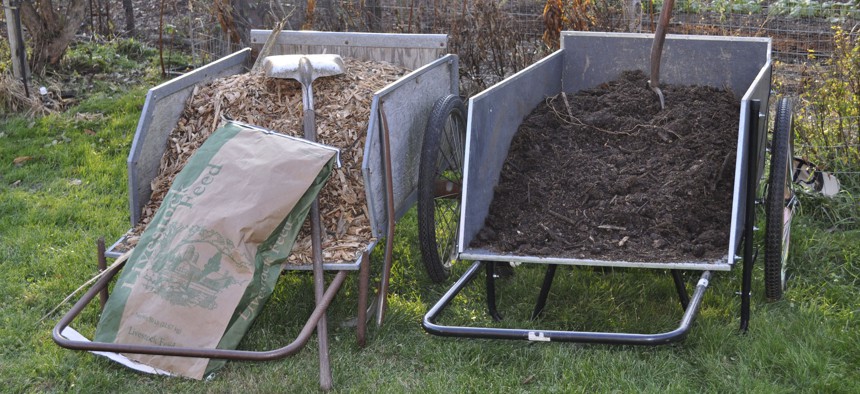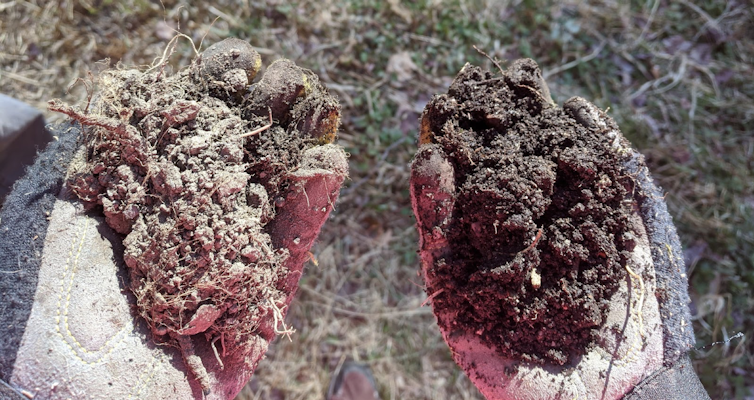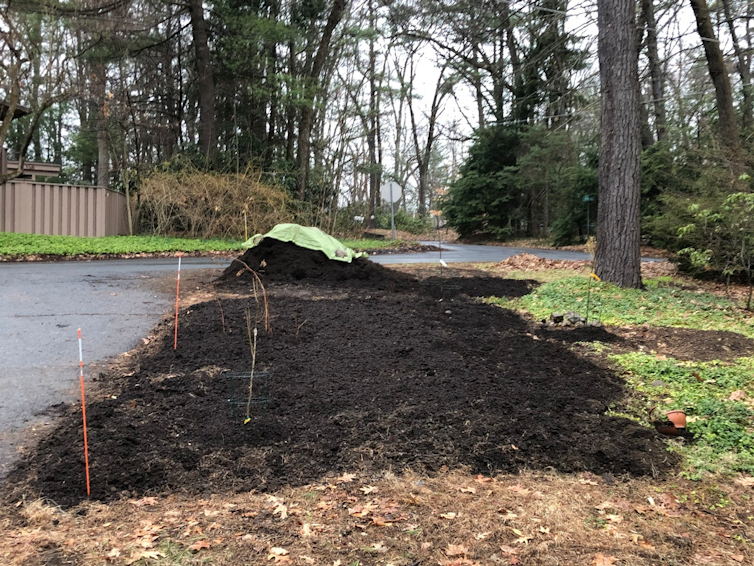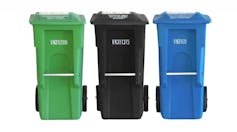City Compost Programs Turn Garbage Into ‘Black Gold’ that Boosts Food Security and Social Justice

That's compost on the right. AP Photo

Connecting state and local government leaders
COMMENTARY | Municipal composting programs, if executed on a large scale, can reduce food waste, cut greenhouse gas emissions and promote better stewardship of our soil.
Almost overnight, the Covid-19 pandemic has transformed many Americans’ relationships with food. To relieve some of the stress associated with shopping safely for groceries and ensure food security, many people are once again planting “victory gardens.” This tradition hearkens back to previous generations who cultivated home gardens during both World Wars.
Interest was high even before the pandemic. In 2014 the National Gardening Association reported that 42 million U.S. households—about 1 out of every 3—grew some kind of food, either at home or in community gardens.
But home gardening isn’t always easy. Poor soil quality will hamper vegetable growth and food production. And many gardeners, especially in lower-income communities, don’t have access to resources that can improve the soil.
We are scholars who have analyzed the power of microbes in settings that include forest soils and permafrost, the built environment, and digestive systems and agricultural soils. In our view, the time has come for major public investments in a well-known gardening resource: compost.
Microbes make compost by breaking down organic matter, such as food scraps. Compost improves soil health so dramatically it’s often called “black gold.” Large-scale municipal composting is a public resource that can reduce food waste, cut greenhouse gas emissions and promote better stewardship of our most valuable natural resource: soil.
How Compost Feeds Soils
Healthy soils are living mixtures of minerals, microbes, organic matter, water and air. Unhealthy soils may contain fewer microbes or less organic material. This makes them less active and less helpful for plants. Poor soils have trouble holding water, and are unable to decompose organic material into usable building blocks for new growth.

Making degraded soils healthier requires feeding the microbes. They need new organic matter—plant or animal tissues—that they can break down and recycle.
In healthy soil, some of that food comes from growing plants that fix carbon from sunlight and pump almost half of it, in the form of sugars, into the soil. In exchange, the microbes provide other nutrients that plants can’t acquire on their own.
Soil microbes also feed on old organic matter, like leaf litter and dead roots. And new biochemical analyses suggest that when these microbes die, they become part of soil organic matter themselves.
To make good compost, you mix green plant waste, like vegetable peels, garden leaf litter or straw, with brown organic matter like soil or manure. Then, over weeks to months, microbes turn the mix into compost, which looks just like soil.
This process produces heat as the microbes break chemical bonds in the plant matter, releasing energy. Compost piles can reach internal temperatures up to 170 degrees F. The heat kills potential microbial pathogens that can ride along with manure inputs.
When gardeners add compost to soils, the organic matter in the compost acts like a sponge for water. It also is a reservoir for nitrogen, phosphorus and other micronutrients that plants need to grow.

Access to Compost Is an Equity Issue
If compost is such a great resource, why don’t more people make their own? In many ways, healthy soil is a luxury. For starters, it takes time to set up a compost pile, followed by continued maintenance—adding browns and greens at the right intervals, watering the pile and turning it over weekly in summer or monthly in winter.
Composting also takes tools and construction materials that not all aspiring gardeners can afford. It requires access to space, and a friendly regulatory environment that allows residents to create compost piles, which can produce odors and attract pests if they are not managed properly.
Factors like these are increasing interest in municipal composting programs, in which a community collects and processes residents’ organic materials. These programs typically accept food and yard waste from restaurants, schools, businesses and local residents, and create a large-scale, professionally run composting facility.
Municipal composting saves money for communities by diverting food waste from landfills. It also promotes sustainability by reducing emissions of methane, a powerful greenhouse gas produced in landfills when waste breaks down in the absence of oxygen. And combining lots of different waste sources improves the breakdown of organic materials and generates more nutritious compost.
Many municipal programs allot participants a certain volume of compost in return for the waste they provide. And some offer pickup and delivery.
Growing Compost Programs
We encourage people with the necessary time and resources to try home composting. However, creating and supporting municipal composting is necessary to meaningfully reduce greenhouse gas emissions from food waste and increase access to healthy soil.
Composting programs are sometimes available through local community gardens or farms. Many private companies operate local compost pickup services.

Among U.S. cities, leaders in promoting city-scale composting services include San Francisco, Seattle, and smaller cities like Burlington, Vermont. These programs rely on local ordinances that either offer incentives or require restaurants and other large food waste sources to compost food waste instead of sending it to landfills.
Municipal composting needs consumer support to attract and retain funding and other resources. Demands for land, especially in urban settings, can spur city governments to sell underfunded or underutilized community spaces for commercial use – especially if local neighborhoods lack social capital to advocate for themselves.
Promoting community-based food production and recycling waste via composting provides many benefits. It creates jobs, expands access to healthy fruits and vegetables, improves the local environment—especially the soil—and helps mitigate climate change. Best of all, investing in local agriculture helps boost the local economy, especially for those who need it most: people seeking better access to safe and nutritious food.
![]()
Kristen DeAngelis, Associate Professor of Microbiology, University of Massachusetts Amherst; Gwynne Mhuireach, Post Doctoral Research Fellow, Biology and the Built Environment, University of Oregon, and Sue Ishaq, Assistant Professor of Animal and Veterinary Sciences, University of Maine
This article is republished from The Conversation under a Creative Commons license. Read the original article.

NEXT STORY: Cloud strategy smoothed State Department’s shift to remote work


